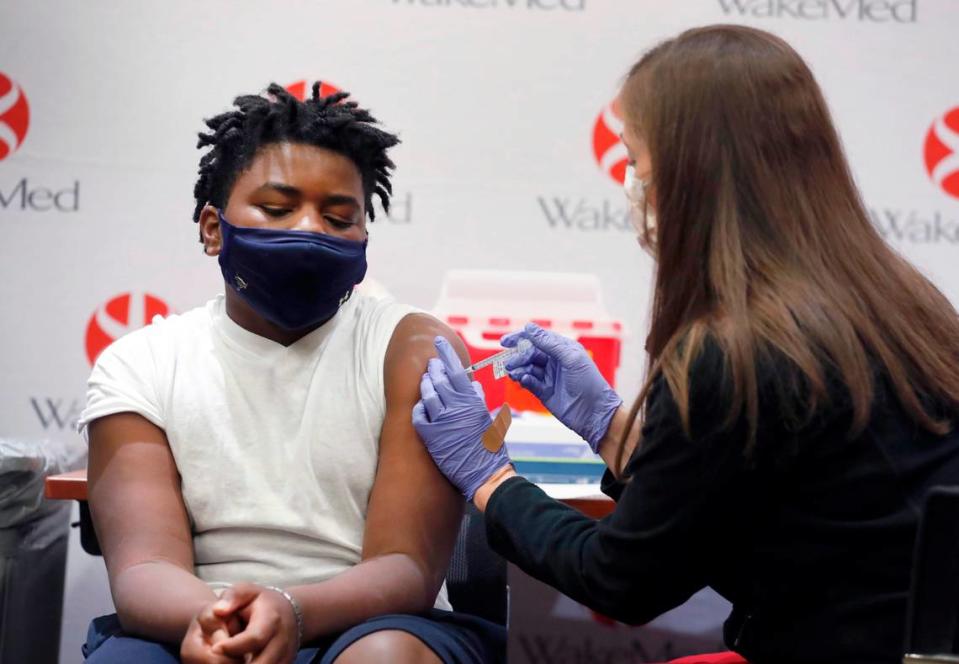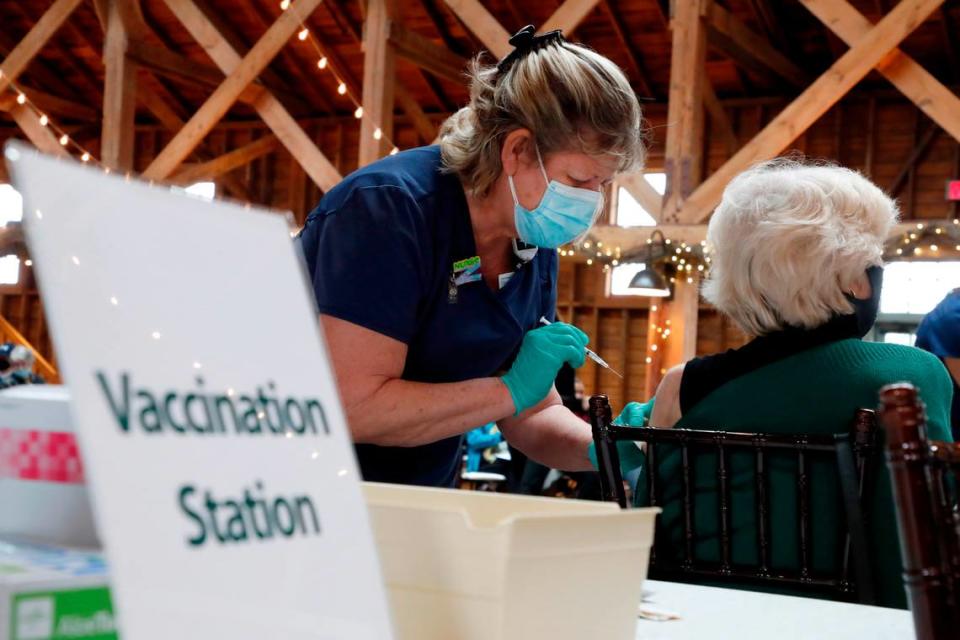Here are the 3 shots you need to get this fall — and when to get them
- Oops!Something went wrong.Please try again later.
We’ve just entered flu season, which typically runs from September to March. Doctors recommend getting vaccinated within this time frame to protect against severe cases of the illness.
The same goes for protecting against COVID and RSV, which can be deadly diseases for many who don’t get vaccinated to protect themselves.
The News & Observer consulted a medical expert at UNC Health and took information from a recent press conference with Duke Health physicians to learn more about the respiratory illnesses on the horizon this fall and winter, and how getting vaccinated can be a life-saving decision.
Our experts:
Dr. David Wohl: Infectious disease expert with UNC Health
Dr. Cameron Wolfe: Infectious disease expert with Duke Health
Dr. David Montefiori: Director of COVID-19 vaccine research and development with Duke Health
Which respiratory illnesses should we prepare for this fall, winter?
Coronavirus, influenza and respiratory syncytial virus infection. In short, COVID, flu and RSV.
• COVID: Coronavirus disease is an infectious disease caused by the SARS-CoV-2 virus. Most infected people will experience mild to moderate respiratory illness and recover without requiring special treatment.
But anyone can get sick with COVID-19 and become seriously ill or die at any age. Nearly 7 million people have died of the disease across the world.
The virus can spread from an infected person’s mouth or nose in small liquid particles when they cough, sneeze, speak, sing or breathe.
Learn more at cdc.gov/coronavirus or who.int/health-topics/coronavirus.
• Flu: Influenza is a contagious respiratory illness caused by influenza viruses that infect the nose, throat, and sometimes the lungs. It can cause mild to severe illness, and at times can lead to death.
Flu viruses spread mainly by tiny droplets made when people with flu cough, sneeze, or talk.
Learn more at cdc.gov/flu.
• RSV: Respiratory syncytial virus is a common respiratory virus that usually causes mild, cold-like symptoms. Most people recover in a week or two, but RSV can be serious. Infants and older adults are more likely to develop severe RSV and need hospitalization.
Learn more at cdc.gov/rsv.
Routine vaccinations, including #COVID19vaccines, are key to taking care of yourself and your community. Visit https://t.co/5TmKuLEGfu to find a vaccine provider. #DontWaitToVaccinate pic.twitter.com/pRmwpKylzx
— NCDHHS (@ncdhhs) June 3, 2023
Which vaccines should we be getting?
(Almost) everyone should get a flu and COVID vaccine.
• Infants aged 0 to 6 months should not receive either vaccine, according to the Centers for Disease and Prevention’s official guidance. There is currently no FDA-authorized vaccine for either virus for infants this young.
• That means flu and COVID vaccines are strongly recommended for everyone six months and older, with very rare exceptions.
UNC’s Wohl recognizes some people are skeptical about getting vaccines, but he pushes for everyone eligible to get them.
“When you compare the two, it’s a no-brainer. The virus’ side effects are much, much worse than anything that we’re concerned about from the vaccines,” he said.
Only a small portion of the population should get an RSV vaccine.
• This includes people who are 60 and older who have compromised immune systems and/or heart problems who would be deeply impacted by a flu-like virus.
• Young children and pregnant people can also be candidates for RSV vaccines. Talk to your doctor to see if the RSV vaccine is right for you.
Note: RSV vaccines typically last two years, and they are not to be taken annually.
"Getting your #COVID19vaccine has become a part of regular health care that's recommended for everyone." - Dr. Charlene Wong of @DukeHealth
Visit https://t.co/5TmKuLEGfu to learn more about #COVID19 vaccines, testing and treatment. pic.twitter.com/y04c6ZDM55— NCDHHS (@ncdhhs) June 2, 2023
Can we get both COVID, flu and RSV vaccines at once?
Yes. It’s perfectly safe to get all three shots at the same time.
A common strategy is to get one vaccine per arm. If you were to have a localized reaction, you can identify which shot was the cause, UNC Health physician Dr. Anita Skariah previously told The N&O.
“You might be a person that says, you know what, I’m just going to get all the shots I need and take some Tylenol that night, knowing I’m going to feel pretty crummy, but I don’t have to go back and do it all over again,” UNC’s Wohl said.
Should we get a specific COVID, flu, RSV vaccine?
• Flu vaccines: These are widely available, and the vast majority of people can get the flu shot offered for free at their nearest pharmacy.
Some medical offices also offer a flu nasal spray vaccine, available for people ages two through 49. This may be a more popular option for children or others who don’t like needles.
The CDC says this option isn’t for everyone — such as pregnant people or children with asthma — so talk to your doctor to see if this may be a good option for you or your child.
• RSV vaccines: These only have one option. The RSV vaccine is very recent, having only been rolled out with FDA approval last year. So there’s no need to talk to the medical professional about getting the “right kind.”
• COVID vaccines: It’s safe to get any of the three COVID vaccines, which are Moderna, Pfizer and Novavax. (The Johnson & Johnson vaccine is no longer available.)
The brand you’ve received in the past doesn’t make too much of a difference for the vaccine you’ll want to get this year.
“It doesn’t matter which of the three vaccines you get, as long as you get one of them. We’re really talking about Coke and Pepsi here,” UNC’s Wohl said.
A new round of COVID vaccines is expected in late September, Duke’ Wolfe said during a briefing last week.
So wait a few weeks if you can to make sure you’re getting the most up-to-date version. Find more information about that below.

Do all COVID vaccines protect against the latest strain of the virus?
Yes, though a new vaccine is expected to become available in the next few weeks with the latest technology to protect against the latest strains.
“The old vaccines certainly help protect us against these new variants, and they all have a commonality that doesn’t make them useless. Some people think that the old vaccines don’t work at all, but they do work, and they protect us in a number of different ways,” UNC’s Wohl said.
“But I like the new vaccine that’s coming out, and I can’t wait to get it. I think we should all get it. It’s going to be great at protecting us against new variants.”
COVID vaccine companies predict that the newest vaccine will hit shelves in mid- to late September, Duke’s Wolfe said, which are designed to target the XBB strain of the Omicron variant.
“Scientists expect that the updated booster, which is a closer match to that variant than any of the other boosters that we’ve had, will remain highly effective against that variant and all of the currently circulating variants,” Duke’s Montefiori said.
Should I wait until the next COVID vaccine comes out to get my shots?
Yes, especially because these vaccines are expected within the next week or two.
“I think the timing works out pretty well. If we had all gotten it mid to late summer, it may not have been working as well as we’d like to protect us from infection during the surge in the winter,” UNC’s Wohl said.
“So maybe a silver lining to it being available after school started is that it’s going to protect us better during the winter and winter break period, when we’ve seen the surges before.”
Pharmacies typically get and begin administering vaccines before hospitals and clinics, he said.
So if you want a COVID shot quickly, it would probably be your best bet to make an appointment at a pharmacy in the next few weeks.

What’s the difference between the COVID vaccines?
COVID vaccines use either mRNA or virus technology.
While infectious disease experts say it’s safe to get any of the three available COVID vaccines, you can still talk with your healthcare provider to learn if you should receive a specific kind.
The vaccines do have some differences to them. Here’s how UNC’s Wohl explained it:
• mRNA technology: Moderna and Pfizer are mRNA vaccines.
“These work by injecting mRNA, which is basically like a text message that cells use to communicate with one another. This mRNA tells a person’s cells to make the spike protein of the COVID virus,” Wohl said.
“mRNA is not alive. It’s just a string of proteins that once the message gets delivered is eaten up, so more like SnapChat than a text!”
Once the cell makes spike proteins, the body makes antibodies and specialized cells that can recognize these spike proteins. That recognition protects us when the real virus comes along, as these antibodies and cells neutralize the virus immediately.
• Virus technology: Novavax vaccines use virus technology.
Scientists infect cells from a moth wing (yes, a moth!) with a virus that has a gene that tells the moth cell to make COVID spike proteins. Once the moth cell does, they harvest the spike and attach them together into nanoparticles that they inject into people.
Again, the body sees the spike proteins and creates antibodies and cells that help us fight the virus if we get infected.
Where can we get COVID, flu, RSV vaccines?
Vaccines are available at healthcare provider’s offices and many pharmacies, including national chains and locally owned neighborhood places.
The Centers for Disease Control and Prevention has online vaccine finders.
To find a flu shot, visit covid19.ncdhhs.gov/flu.
To find a COVID shot, visit vaccines.gov/search.
To find an RSV shot, talk to your doctor.
Can you get free vaccines at pharmacies?
Yes, many pharmacies offer free flu shots.
A number of national pharmacies — such as CVS, Walgreens, Rite Aid and Walmart — offer them at no cost to the public. Many local neighborhood pharmacies offer free shots too.
Call your nearby location to learn how to make an appointment (or if they accept walk-in patients).
Students, faculty and staff members at our local universities can also check in with their schools to learn if/how they can get free flu shots on campus:
Duke University: flu.duke.edu/vaccination
NC Central University: nccu.edu/dsa/health-wellness
NC State University: healthypack.dasa.ncsu.edu
St. Augustine’s University: st-aug.edu/gordon-health-center
UNC Chapel Hill: flu.unc.edu
COVID shots are available at no out-of-pocket cost to adults with insurance, though a number of pharmacies expect to receive vaccines to be given out for free to uninsured adults. (See below for more detailed information.)

Are these vaccines free?
Yes, if you have insurance.
Blue Cross Blue Shield, North Carolina’s largest health insurance carrier, covers “both the cost of the vaccine and vaccine administration at 100%” when members receive the COVID and/or flu vaccine with an in-network provider, said spokesperson Laura Eberhard.
This is available to nearly anyone who has insurance, as these vaccines are recommended for everyone older than 6 months of age.
RSV vaccines are also covered for children up to 19 months of age and for adults age 60 and older when Blue Cross patients see in-network providers.
Learn more at bluecrossnc.com/members/preventive-care.
If you don’t have insurance, you can probably still track down a free vaccine.
• For adults: The CDC’s forthcoming Bridge Access Program will provide free COVID vaccines and treatments to uninsured and underinsured adults.
“The state will receive a limited supply of free vaccines for uninsured adults. We will ensure it goes to our safety net providers that care for our uninsured populations – e.g., Community Health Centers, local health departments,” said NC Department of Health and Human Services spokesperson Bailey Pennington Allison.
The federal government will also be sending a supply of free vaccines to pharmacies for uninsured adults, she said.
• For children: Underinsured children and those covered by Medicaid will also be able to receive free vaccines through the Vaccines For Children Program.
When is the ideal time to get COVID, flu, RSV vaccines?
September or October.
Flu season begins this month, and experts are encouraging people to get their flu and COVID vaccines in one appointment at the very start of the season.
But any cool-weather month is a fine time to get your vaccinations, and it’s only “too late” when warm weather is back again, UNC’s Wohl said.
If November or December rolls around and you haven’t been vaccinated yet, you can absolutely still go to a pharmacy or doctor’s office and get your annual doses.
Cicadas are at their peak — so you may see more copperheads. Snake expert explains
Forbes names NC’s best employers. 19 are headquartered in the Triangle

